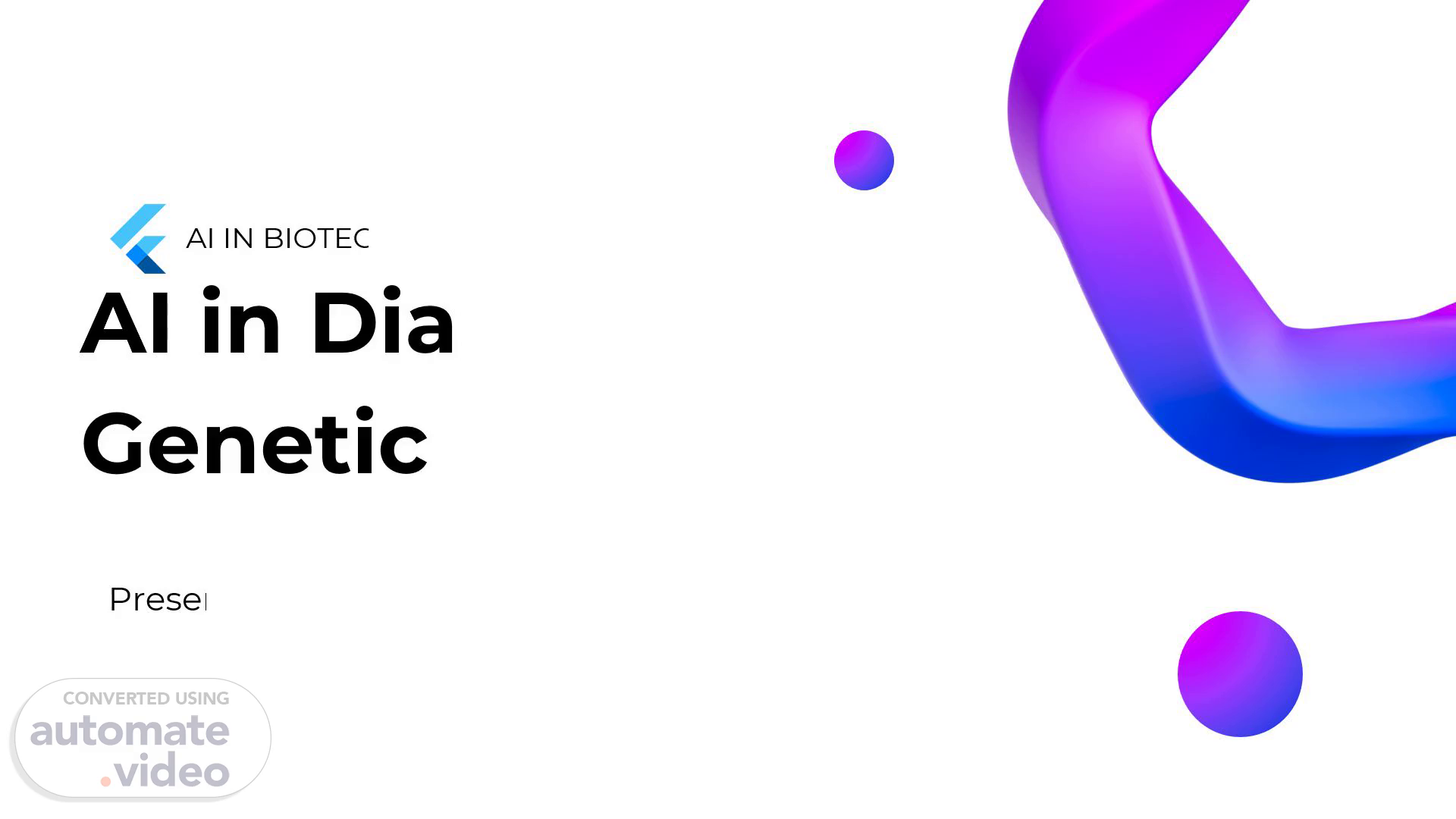Scene 1 (0s)
AI in Diagnostics of Genetic Diseases. AI IN BIOTECHNOLOGY.
Scene 2 (9s)
Challenges in Genetic Disease Diagnosis. Introduction.
Scene 3 (28s)
AI Applications in Genetic Diagnostics. Genomic variant analysis with pathogenicity prediction Facial phenotyping using computer vision (e.g., Face2Gene) Clinical decision support via Natural Language Processing (NLP) Automated extraction of phenotypic terms from EHRs.
Scene 4 (41s)
Key AI Technologies. Deep Learning: CNNs, Graph Neural Networks (GNNs) Machine Learning: Random Forest, SVM, Ensemble methods Natural Language Processing for phenotype annotation.
Scene 5 (52s)
Genomic Variant Analysis. AI tools: CADD, REVEL, PrimateAI scoring systems Graph-based models for multi-variant impact prediction Integration of whole genome sequencing data Applications in precision medicine for personalized care.
Scene 6 (1m 5s)
Genomic Variant Analysis. AI tools: CADD, REVEL, PrimateAI scoring systems Graph-based models for multi-variant impact prediction Integration of whole genome sequencing data Applications in precision medicine for personalized care.
Scene 7 (1m 11s)
Genomic Variant Analysis. DeepVariant: Google's deep learning method for accurate variant calling from sequencing data Exomiser: Prioritizes variants using phenotype-driven gene prioritization SpliceAI: Deep learning tool to predict splice site variants impact Multi-omics integration tools combining genomics, transcriptomics, and proteomics data for comprehensive analysis.
Scene 8 (1m 27s)
Facial Phenotyping & Computer Vision Tools. Face2Gene platform: Widely used for syndrome recognition from facial images DeepGestalt: Deep learning algorithm with high accuracy in facial phenotype detection GestaltMatcher: AI tool for matching facial phenotypes in ultra-rare syndromes AI-driven 3D facial analysis systems for enhanced phenotypic resolution.
Scene 9 (1m 42s)
Clinical Decision Support & NLP Tools. ClinPhen: Extracts Human Phenotype Ontology (HPO) terms from clinical notes PhenoTips: Integrates phenotype and genotype data for clinical reporting HPO Annotator: Automated phenotype annotation from electronic health records SeqOne Diagai: AI-powered decision support integrating genomic and clinical data for diagnostics.
Scene 10 (1m 58s)
Success Stories & Case Studies. Mount Sinai AI model predicts genetic disease risks accurately AIIMS tools improving diagnosis of rare ciliary disorders UK Biobank annotated 500,000 genomes in 90 minutes with AI AI-driven discovery of novel genes in rare.
Scene 11 (2m 12s)
Facial Phenotyping & Computer Vision Tools. Face2Gene platform: Widely used for syndrome recognition from facial images DeepGestalt: Deep learning algorithm with high accuracy in facial phenotype detection GestaltMatcher: AI tool for matching facial phenotypes in ultra-rare syndromes AI-driven 3D facial analysis systems for enhanced phenotypic resolution.
Scene 12 (2m 28s)
Current Limitations & Challenges. Scarcity of data on ultra-rare diseasesAlgorithm biases and transparency issues Ethical concerns: privacy and discrimination risks Integration hurdles with existing clinical workflows Regulatory and cost challenges.
Scene 13 (2m 40s)
Future Directions. Explainable AI (xAI) for clinical trust and transparency Federated learning models preserving data privacy Integration with CRISPR and gene editing therapies Real-time genomic data analysis platforms Global collaborative data sharing initiatives.
Scene 14 (2m 52s)
Conclusion. AI is transforming genetic disease diagnostics globally Multi-modal AI approaches show promising accuracy and speed Significant reduction in diagnostic timelines improving patient care Continued research essential to overcome limitations Potential to democratize access to genetic expertise.
Scene 15 (3m 5s)
Thank you.
